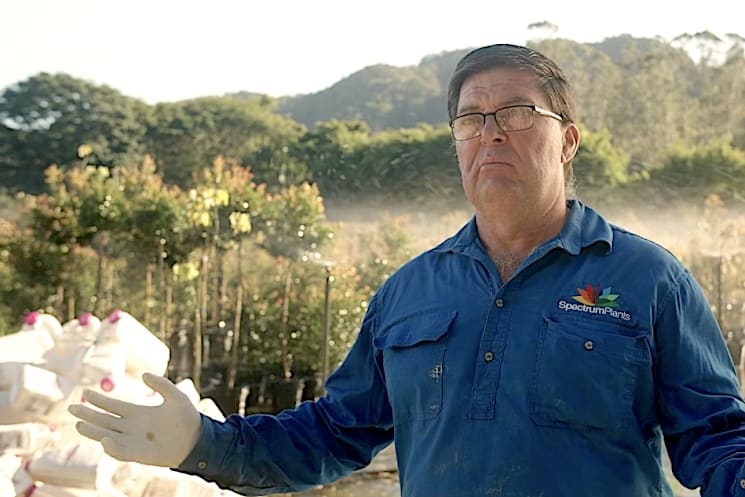
Wesley Trevor stands, in front of scores of used bifenthrin containers, as seen in the new documentary Shattered Dreams.
FOR 30 years, Wesley Trevor operated a thriving nursery in Queensland, with 100,000 plants across seven acres, and at its peak employing 37 staff.
Today, he said the National Fire Ant Eradication Program (NFAEP) has left him with neither a business nor his health, and a family struggling under the weight of a government regime he has branded as “impossible and inhumane”.
The problems began when the NFAEP demanded Mr Trevor chemically treat stock at Southeast Queensland nursery, Spectrum Plants, every 28 days.
That meant pouring 200,000 litres of pesticide per cycle – 2.6 million litres a year – into his soil and potting mix at the nursery that has never had fire ants.
“To keep up with what they expected me to do, I’d have to work seven days a week, 10-and-a-half-hours a day,” Mr Trevor said. “It’s literally impossible.”
But it hasn’t just been the extra workload.
Inspectors have fined him repeatedly: $1,100 for mulch piles, $1,100 for missing paperwork, and $600 for audits failing on technicalities as minor as an undated form.
During the past five years, he estimated that more than 100 government inspectors have arrived at his gate.
Many carried recording devices and read warnings that his words “may be used against you in a court of law”.
“It is like living under surveillance,” Mr Trevor said.
“I was looking up the driveway every day to see when they’d come next. You can’t live like that.”
Runoff from his property, he said, has killed all the turtles, eels and fish in the dam.
“Our entire property is dripping in pesticide,” Mr Trevor said.
The father of eight said the toll has been crushing. Once the employer of dozens, he now has just six staff left.
“I’ve been depressed, suicidal. After audits, I can’t eat or sleep for days,” he admitted.
“I hate looking like a nervous wreck. I’m meant to be the breadwinner.”
For Mr Trevor, the fire ant program is a failure.
“In a few years, they’ll shut it down like they did with covid – admit they couldn’t stop it and tell us we have to learn to live with it,” he said.
“But by then, how many small businesses will have be destroyed?”
Product safety data for Bifenthrin states that it is extremely toxic to aquatic life (fish, crustaceans, daphnia) and is toxic to bees and birds. It has low water solubility and has a half-life in soil of up to eight months. Chronic effects on humans include nerve effects and it is classified as a possible human carcinogen (EPA Class C).





